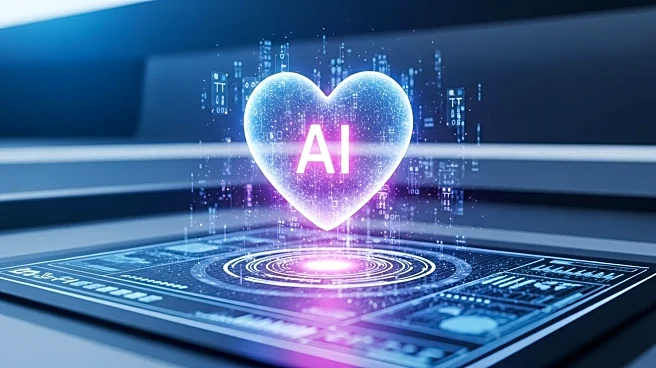What's Happening?
Whitney Wolfe Herd, the founder of Bumble, is spearheading a new initiative to transform the online dating landscape by integrating artificial intelligence (AI) into matchmaking processes. Wolfe Herd's vision is to move beyond superficial swiping based on photos and brief descriptions, aiming instead to create a more meaningful and humanized dating experience. Her approach involves using AI to match individuals based on shared values, goals, and life beliefs, rather than superficial criteria. This initiative is part of a broader trend among dating apps to incorporate AI as a tool for enhancing user experience. Other platforms, such as Sitch and Amata, are also exploring AI-driven matchmaking, while Meta has announced an AI assistant for Facebook Dating. These developments reflect a growing recognition of user dissatisfaction with current dating app models, which often leave users feeling judged and unfulfilled.
Why It's Important?
The integration of AI into online dating could significantly impact how relationships are formed in the digital age. By focusing on deeper compatibility factors, AI-driven matchmaking has the potential to improve user satisfaction and success rates in finding meaningful connections. This shift could also influence the broader dating industry, prompting other companies to adopt similar technologies to remain competitive. For users, the promise of more personalized and thoughtful matchmaking could alleviate the fatigue and frustration often associated with online dating. However, the effectiveness of AI in predicting romantic compatibility remains uncertain, as human relationships are complex and influenced by numerous unpredictable factors. The success of these AI initiatives will depend on their ability to accurately capture and interpret the nuances of human interaction and chemistry.
What's Next?
As AI technology continues to evolve, dating platforms are likely to refine their algorithms to better predict compatibility and enhance user experience. This could lead to more sophisticated matchmaking systems that incorporate psychological insights and user feedback. Companies may also explore partnerships with psychologists and relationship experts to further improve their AI models. The response from users and the dating industry will be crucial in determining the future direction of AI in online dating. If successful, these innovations could set new standards for how digital platforms facilitate human connections, potentially reshaping societal norms around dating and relationships.
Beyond the Headlines
The use of AI in dating raises ethical and privacy concerns, particularly regarding the collection and use of personal data. As dating apps gather more information to improve their algorithms, they must ensure robust data protection measures to maintain user trust. Additionally, the reliance on AI for matchmaking could lead to questions about the role of technology in personal relationships and the potential loss of human agency in the dating process. These developments may prompt broader discussions about the balance between technological innovation and the preservation of authentic human experiences.









